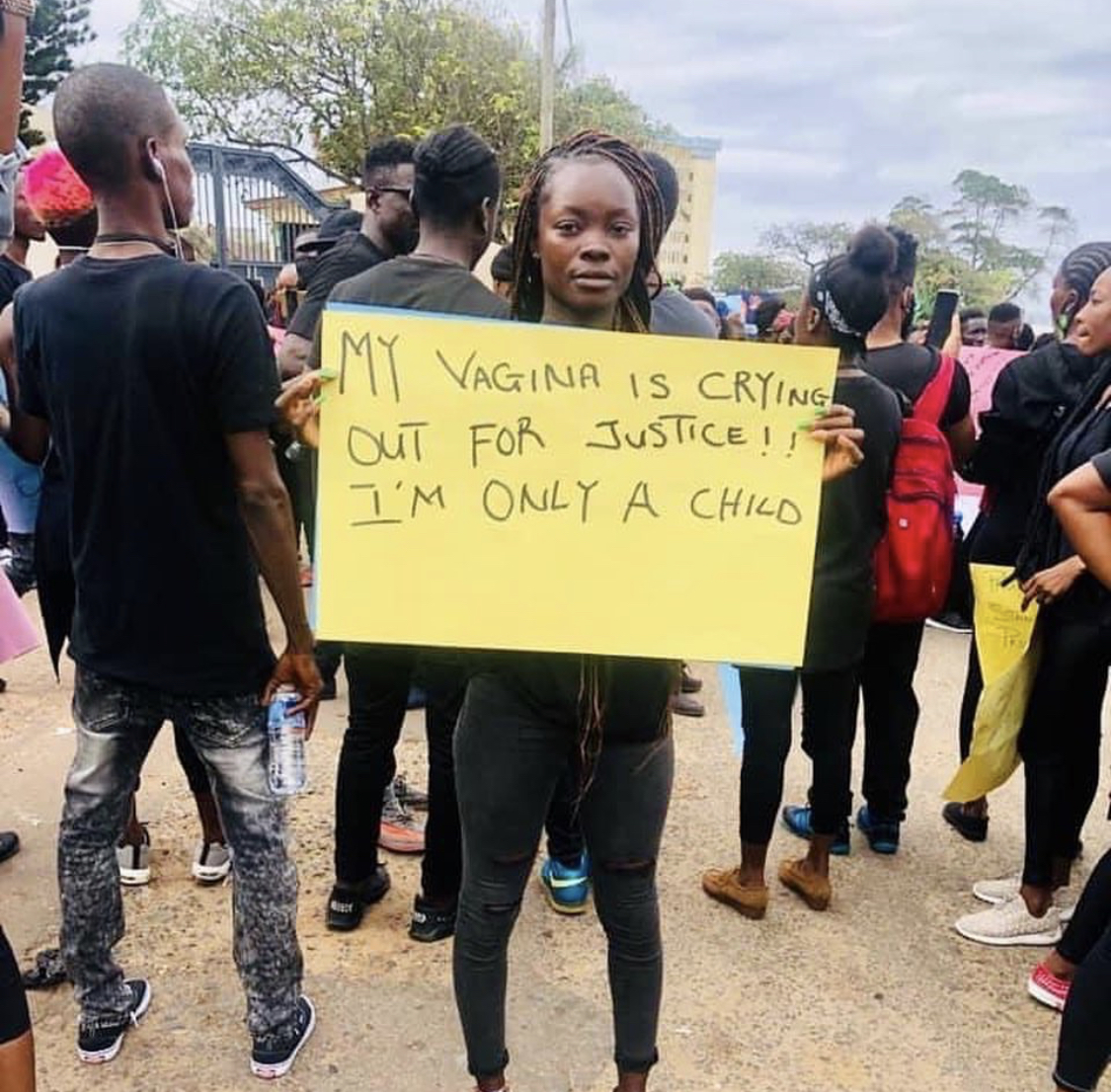It is no news that Liberia has an active culture of protest. Whether said protests are based on principle or the popularity of the organizers is something to talk about later. Whether said protests are driven by the selfish interest of politicians or activists is something of less concern now. Historically, Liberia is a politically sensitive country and too often the expression of dissent is done through protests. The anti-rape protest is a fair illustration. But it’s often those who sit on the sidelines, like myself, who engage in arguments about the characters of those who put their lives on the line for a cause rather than focusing on the root causes of the protests. As we have seen over the last few days, people are reducing the anti-rape protests in the country to individuals rather than the cause. This reductionism trivializes the problem of rape, blinds us to the issues causing the protests, and explains why they are not taken seriously. When we focus on meaningless debates that center around individuals rather than the collective aspiration, we stand the risk of polarizing issues that require general consensus in order to be addressed.
Some would argue that protests are not taken seriously given how frequently they happen, and the fact that they are mostly done by opposition leaders and activists — sometimes with ill intention, i.e. the exploitation of the anguish of the Liberian masses. That makes sense and could be true, but these protests are inspired by issues that the government of the day, because of its arrogance and disregard for the Liberian people, is refusing to acknowledge. The protests are less about people associating with it and more about people affected by rape and other forms of sexual abuse. It’s about public safety, especially for women. Public safety and collective interests must be the foundation for how we respond to the activity and action of a movement, especially in times of crises. Every social problem must be uniquely examined on its causality and the exigency of the moment to inform public support or participation. In these times, solutions can come from anyone, as long it’s for the social good. People are allowed to affiliate themselves with social justice movements; even if their intentions are varied, it doesn’t change the fact that there’s something wrong and needs fixing. We must not be quick to gloss over movements because of our spite for some of the actors involved. Our judgment and criticism of movements must not be on “WHO” but “WHY.”
Over the last seven months, Liberians have been victims of about 950 cases of rape, with at least 600 cases reported during the COVID-19 State of Emergency. According to the Sexual Gender Based Violence Unit of the Ministry of Justice, of the total new cases from January to June, 107 cases were tried in court, leading to 44 convictions and 42 acquittals. These ranged from gruesome attacks on women, forceful penetration of little girls and despicable sodomy of boys – some by pastors and police officers. We may peripherally discuss these issues and pay lip service as we always do. We may even hide behind flyers and give ourselves fancy titles like “Feminist-In-Chief” while letting the rape of young girls and boys to continue, because we hate certain people that affiliate themselves with the movement advocating for drastic measures against rape. But we must not forget that we have a much more serious issue going on than we care to admit it. And these issues are not about our usual political debates or certain people in public office. They are bigger than that. It’s about all of us and the patriarchal nature of our culture that makes men feel entitled to the bodies of women.
Only if some people, like our self-declared Feminist-In-Chief, can wake up from the slumber of their arrogance, we would be having a national conversation on how we can collectively ensure the security of children and women from rapists that we all, through our culture, create the space for.
Our “Feminist-In-Chief” is not the cause of rape in Liberia, neither is COVID-19. The actual cause is the collective subconscious or organizing principles of the values that we owe our identities to. It’s the very foundation and constitution of the Liberian conscience— rooted in our culture. Our dear “Feminist-In-Chief” must know that we know that. He must know that we know that Liberia has a rape culture as victims are blamed for the harm done to them. That we are generally more empathetic to rapists as we blame rape victims for dressing a certain way, and that sometimes the first thing Liberians care about when a person is raped is whether or not they are saying the truth rather than catering to their trauma.
Our dear “Feminist-In-Chief” must know that we are not blaming him for rape, we’re blaming him for not being hard on rape with all the power we have given him. He must realize the protest is not against him, and if he cared at all about the violence against women and little children, there wouldn’t be a protest in the first place. The government would have ensured people are held liable for their crimes and made an effort to protect the vulnerable of our nation from harm. The vulnerable of our nation like the innocent 3-year-old who was raped in Gbarpolu. The wretched of our nation like the 14-year-old who was raped vaginally and anally a few days ago in Paynesville. Everyone who has been defiled, raped, and or killed through rape over the last seven months and beyond are the vulnerable of our nation, and our government owes it to them to step up. Every woman, girl and boy who lack the power to defend themselves against these maniacs and predators that our culture creates are the vulnerable of our nation, and we, the society and our government, owe it to them to not just speak up, but to take action and put an end to the vicious cycle of rape and war on women.
We’re at war with rape, and the almost absolute silence of our president, our supposed Feminist-In-Chief, and his bandwagon of officials, is empowering rapists.
It is essential to note that the rape protests were about a non-political issue. Playing devil’s advocate though, while it is understandable that protestors were frustrated and angry at the turn of events, throwing invectives at the president could have given the impression of a political vendetta.
This final paragraph is not a critique of the organizers of this rape protest, but it is a general truth that must be kept in mind when dealing with these matters. The leadership of movements against rape must be reexamined as they fuel the culture of patriarchy that makes women pawns in a man’s world. While men must ally with women to stop rape, we need more women to speak from their experiences and change the outlook of our culture that influences rapists. The cultural perspectives on women, sex, gender and gender roles, places women at the bottom of the hierarchy of power to be ruled and controlled by men. We cannot be advocating for liberation of women’s bodies with men so entrenched at the top. As we have witnessed, to paraphrase Biko, men are the main precipitants of rape against women, and at the same time the main participants in opposition to that rape. You cannot have shift in patriarchy, misogyny and rape when women are always at the side lines, following the men, rather than defeating the totality of masculine dominance and patriarchy. Women must own the movement to prevent people like our self-declared “Feminist-In-Chief” from feeling entitled to position themselves as leaders in the movement against crimes primarily perpetrated by men themselves. Men must be followers and not leaders on issues victimizing women.
Authored by: Ansumana Konneh
Featured Image by: Tuzee


Great piece!
I have read it twice.